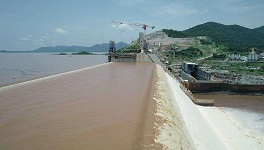BY HENOK TADELE HAILE – While THE US Foreign Secretary Antony Blinken with his Ethiopian counterpart Demeke Mekonnen were enjoying coffee last week here in Addis Ababa, Egypt’s foreign minister, Sameh Shoukry, was busy threatening Ethiopia in connection with the construction of the Grand Ethiopian Renaissance Dam (GERD).
In terms of power generation, the GERD is the biggest dam under construction in Ethiopia. Upon completion, it would be Africa’s number one hydroelectric generator. It will also create the continent’s second-biggest man-made lake, next to the Aswan Dam.
According to Shoukry’s rhetoric, “all options are open, and all possibilities remain available.” His bellicose rhetoric came just a week after his country demanded Arab nations to pressure Ethiopia as the GERD is an issue of his country’s national security.
Shoukry’s rhetoric reminds me of the late Egyptian President Mohamed Morsi’s televised rhetoric a decade ago. “We will never allow Egypt’s water security to be infringed; all options are open for us to deal with this (GERD). If a single drop of Nile water is lost, our blood will be the alternative.” Mursi claimed to be back then.
Yet, a decade after that speech, Ethiopia has managed to impound over 22 billion cubic meters of water behind the GERD and is expected to fill at least another 10 billion cubic feet of water this summer if it rains as expected.
For anyone who follows the issue of the Nile, Egypt’s bellicose rhetoric against Ethiopia is nothing new. In 1979, after signing a peace deal with Israel following the October war, the then Egyptian president Anwar Sadat said, “The only matter that could take Egypt to war again is water.”
Over the last 12 years, while Ethiopia continued to build the GERD, Egypt has continued to threaten Ethiopia. However, the construction is nearing fait accompli without any sign of war between the two African giants. Now it is too late to bomb the dam, as it holds over 22 billion cubic meters of water. The release of that much water could easily obliterate both Cairo and Khartoum.
Even though the pro-Egypt media always claim that Egypt would go thirsty if Ethiopia sips a single drop of water from the Nile River, the reality on the ground is very different.
Detailed research by the British Geological Survey and University College of London (UCL), entitled ‘Quantitative maps of groundwater resources in Africa’, has uncovered that Egypt is the fourth-richest country in Africa regarding underground water reserves, followed by Libya, Algeria and Sudan respectively.
In fact, the study suggested that, excluding Sudan and DRC, Egypt is almost twice as rich as all the Nile Basin countries put together, including Ethiopia, Kenya, Tanzania, Eritrea, Uganda, Burundi and Rwanda. The amount of Egypt’s groundwater storage is estimated to be 55,200 cubic km.
While Ethiopia, Kenya, Tanzania, Eritrea, Uganda, Burundi and Rwanda combined have only 27,558 cubic km of underground water.
According to the research funded by a British organization, the Department for International Development (DFID), Ethiopia’s rank in underground water reserves is far behind Egypt, as it is the 13th richest in Africa with 12,700 cubic km.
Even though Egypt has massive underground water reserves, enough for many generations to come, some 97 percent of its water supply comes from the Nile River. That shows how minuscule Egypt’s effort is to develop its massive underground water reservoir.
Even if the Nile suddenly stops flowing to Egypt, Cairo has plenty of water underground, enough for thousands of years to come until advances in desalination technology makes water much cheaper.
However, Egypt failed to develop its groundwater potential. Instead, Cairo built several small-scale desalination plants over the Red Sea and the Mediterranean coast.
It is known that desalination plants are at least 10 times more expensive than developing underground water reserves. But who cares, Egypt has plans to build many more by 2037.
Rather than developing its huge underground water resources, Egypt has preferred to build the biggest army in Africa and the Middle East, to scare off less powerful and economically weaker upper Nile riparian states, including Ethiopia, hoping to deter them from developing any projects on the Nile.
For Egyptian politicians, a huge military is considered a robust insurance policy to secure the country’s water future. This is not feasible from an economic point of view and is a political disaster in the making, as it only fuels hatred toward Egypt in upper riparian countries.
It is morally absurd too, as countries like Ethiopia, which contributes 86 percent of the water flow of the Nile River, are denied the right to sip from it.
No matter how in turmoil Ethiopia is, its economic fortune is slowly changing to enable it to build half a dozen other mega dams on the Nile. No matter how weak Ethiopia seems internally, the issue of the Nile is the ultimate proven unifying factor that Ethiopian politicians easily exploit.

